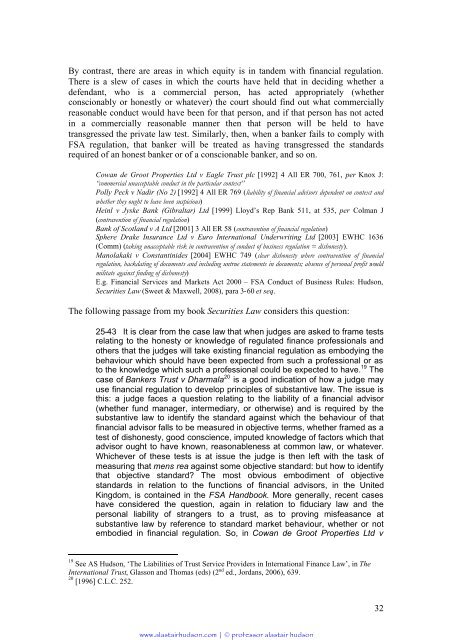England's dreaming equity, trust and conscience - alastairhudson.com
England's dreaming equity, trust and conscience - alastairhudson.com
England's dreaming equity, trust and conscience - alastairhudson.com
Create successful ePaper yourself
Turn your PDF publications into a flip-book with our unique Google optimized e-Paper software.
By contrast, there are areas in which <strong>equity</strong> is in t<strong>and</strong>em with financial regulation.There is a slew of cases in which the courts have held that in deciding whether adefendant, who is a <strong>com</strong>mercial person, has acted appropriately (whetherconscionably or honestly or whatever) the court should find out what <strong>com</strong>merciallyreasonable conduct would have been for that person, <strong>and</strong> if that person has not actedin a <strong>com</strong>mercially reasonable manner then that person will be held to havetransgressed the private law test. Similarly, then, when a banker fails to <strong>com</strong>ply withFSA regulation, that banker will be treated as having transgressed the st<strong>and</strong>ardsrequired of an honest banker or of a conscionable banker, <strong>and</strong> so on.Cowan de Groot Properties Ltd v Eagle Trust plc [1992] 4 All ER 700, 761, per Knox J:“<strong>com</strong>mercial unacceptable conduct in the particular context”Polly Peck v Nadir (No 2) [1992] 4 All ER 769 (liability of financial advisors dependent on context <strong>and</strong>whether they ought to have been suspicious)Heinl v Jyske Bank (Gibraltar) Ltd [1999] Lloyd’s Rep Bank 511, at 535, per Colman J(contravention of financial regulation)Bank of Scotl<strong>and</strong> v A Ltd [2001] 3 All ER 58 (contravention of financial regulation)Sphere Drake Insurance Ltd v Euro International Underwriting Ltd [2003] EWHC 1636(Comm) (taking unacceptable risk in contravention of conduct of business regulation = dishonesty).Manolakaki v Constantinides [2004] EWHC 749 (clear dishonesty where contravention of financialregulation, backdating of documents <strong>and</strong> including untrue statements in documents; absence of personal profit wouldmilitate against finding of dishonesty)E.g. Financial Services <strong>and</strong> Markets Act 2000 – FSA Conduct of Business Rules: Hudson,Securities Law (Sweet & Maxwell, 2008), para 3-60 et seq.The following passage from my book Securities Law considers this question:25-43 It is clear from the case law that when judges are asked to frame testsrelating to the honesty or knowledge of regulated finance professionals <strong>and</strong>others that the judges will take existing financial regulation as embodying thebehaviour which should have been expected from such a professional or asto the knowledge which such a professional could be expected to have. 19 Thecase of Bankers Trust v Dharmala 20 is a good indication of how a judge mayuse financial regulation to develop principles of substantive law. The issue isthis: a judge faces a question relating to the liability of a financial advisor(whether fund manager, intermediary, or otherwise) <strong>and</strong> is required by thesubstantive law to identify the st<strong>and</strong>ard against which the behaviour of thatfinancial advisor falls to be measured in objective terms, whether framed as atest of dishonesty, good <strong>conscience</strong>, imputed knowledge of factors which thatadvisor ought to have known, reasonableness at <strong>com</strong>mon law, or whatever.Whichever of these tests is at issue the judge is then left with the task ofmeasuring that mens rea against some objective st<strong>and</strong>ard: but how to identifythat objective st<strong>and</strong>ard? The most obvious embodiment of objectivest<strong>and</strong>ards in relation to the functions of financial advisors, in the UnitedKingdom, is contained in the FSA H<strong>and</strong>book. More generally, recent caseshave considered the question, again in relation to fiduciary law <strong>and</strong> thepersonal liability of strangers to a <strong>trust</strong>, as to proving misfeasance atsubstantive law by reference to st<strong>and</strong>ard market behaviour, whether or notembodied in financial regulation. So, in Cowan de Groot Properties Ltd v19 See AS Hudson, ‘The Liabilities of Trust Service Providers in International Finance Law’, in TheInternational Trust, Glasson <strong>and</strong> Thomas (eds) (2 nd ed., Jordans, 2006), 639.20 [1996] C.L.C. 252.32www.<strong>alastairhudson</strong>.<strong>com</strong> | © professor alastair hudson













